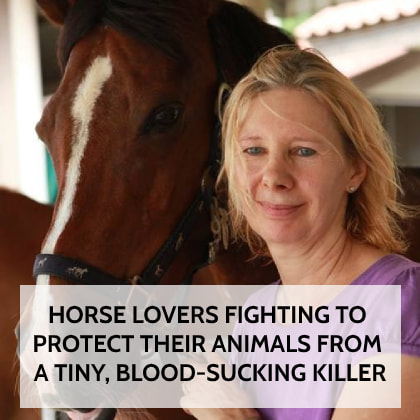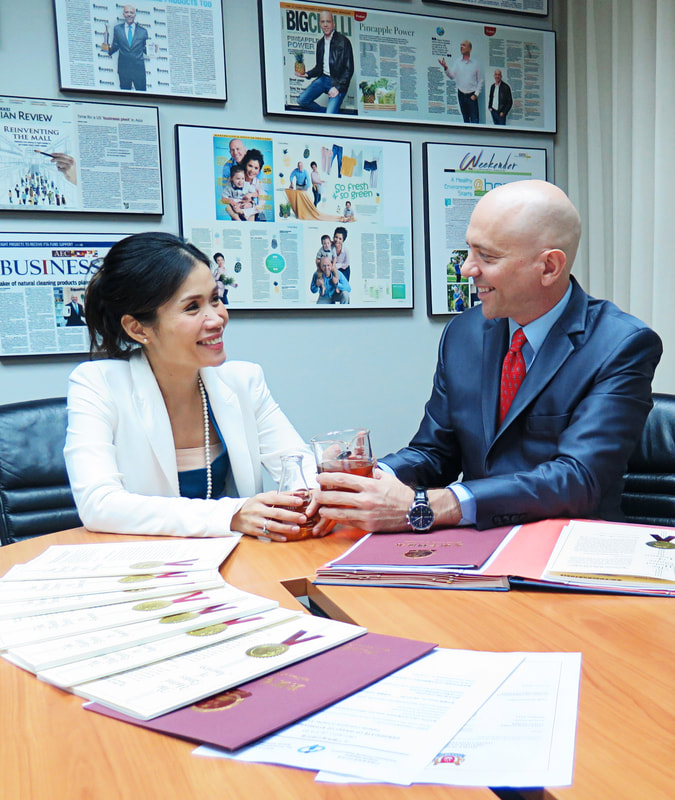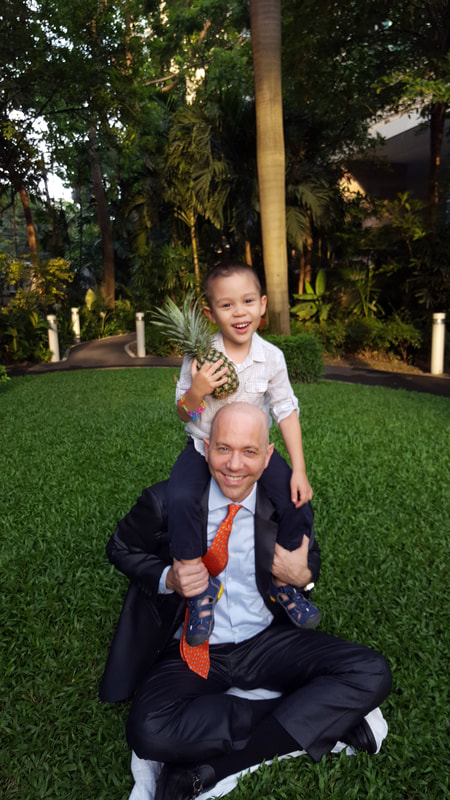With recent heavy pollution in Thailand weighing on people’s minds, we spoke with local entrepreneur couple Peter and Jeng Wainman, founders of the brand Pipper Standard, about how embracing natural products at home can help protect your family.
EARLIER this year, Chiang Mai earned the dubious distinction of being the world’s most polluted city, with Bangkok trailing not far behind. As residents in these cities became increasingly concerned about the hazardous levels of air pollution, some started to check the official PM2.5 airquality index daily, or even hourly, as if it was the common weather report.
Peter Wainman, a U.S. businessman who lives in Bangkok with his wife Jeng and 5-year-old son Ricky, knew he couldn’t remain idle. Wainman suffered debilitating asthma and allergies in the past, and as the air worsened in the Thai capital he moved quickly to “fortify” his home and office, installing multiple air purifiers and buying a portable pollution monitor.
Reducing exposure to harmful chemicals, whether airborne or in everyday products, and helping others do the same, is one of Wainman’s life missions. He and Jeng are the founders of Equator Pure Nature, the Bangkokbased “cleantech” company that manufactures and sells the Pipper Standard brand of natural, hypoallergenic home cleaning products. The company’s motto is “A Healthy Environment Starts at Home”
Their technology is patented globally across approximately 70% of the world’s GDP, including in the U.S., Europe and China. “To our knowledge, we’re the only commercial natural cleaning brand in the world with patented technology,” Wainman says.
Amidst rapid urbanization and industrialization across Asia, ordinary citizens are losing control over the quality of the air they breathe—and
not only in the famously polluted cities of India and China, but throughout much of developed East Asia and Southeast Asia as well. “But we have the ability to eliminate pollution inside our homes,” says Wainman. Let’s start with pollution because that seems to be of people’s minds.
What is the health impact on this, in your view?
Jeng: Well, in the short term the panic speaks for itself. Earlier this year, people were seriously worried about the deteriorating air quality. No one knew when—or even if—it was going to improve. But pollution here isn’t an isolated, one-time problem. We’ve been dealing with it for years, and as a result we’ve seen allergy and asthma rates skyrocket, along with respiratory and other health issues. These problems are increasing across all age groups over time, but they’re particularly bad among children. As a mother, that concerns me.
More than a quarter of Thais have allergies today, including approximately 49% of children in greater Bangkok. The question is: What can we do to help our children? How can we reverse these trends? That’s something we ask ourselves every day. One obvious answer seems to be to limit their exposure to the pollution and chemicals that are contributing to these problems.
EARLIER this year, Chiang Mai earned the dubious distinction of being the world’s most polluted city, with Bangkok trailing not far behind. As residents in these cities became increasingly concerned about the hazardous levels of air pollution, some started to check the official PM2.5 airquality index daily, or even hourly, as if it was the common weather report.
Peter Wainman, a U.S. businessman who lives in Bangkok with his wife Jeng and 5-year-old son Ricky, knew he couldn’t remain idle. Wainman suffered debilitating asthma and allergies in the past, and as the air worsened in the Thai capital he moved quickly to “fortify” his home and office, installing multiple air purifiers and buying a portable pollution monitor.
Reducing exposure to harmful chemicals, whether airborne or in everyday products, and helping others do the same, is one of Wainman’s life missions. He and Jeng are the founders of Equator Pure Nature, the Bangkokbased “cleantech” company that manufactures and sells the Pipper Standard brand of natural, hypoallergenic home cleaning products. The company’s motto is “A Healthy Environment Starts at Home”
Their technology is patented globally across approximately 70% of the world’s GDP, including in the U.S., Europe and China. “To our knowledge, we’re the only commercial natural cleaning brand in the world with patented technology,” Wainman says.
Amidst rapid urbanization and industrialization across Asia, ordinary citizens are losing control over the quality of the air they breathe—and
not only in the famously polluted cities of India and China, but throughout much of developed East Asia and Southeast Asia as well. “But we have the ability to eliminate pollution inside our homes,” says Wainman. Let’s start with pollution because that seems to be of people’s minds.
What is the health impact on this, in your view?
Jeng: Well, in the short term the panic speaks for itself. Earlier this year, people were seriously worried about the deteriorating air quality. No one knew when—or even if—it was going to improve. But pollution here isn’t an isolated, one-time problem. We’ve been dealing with it for years, and as a result we’ve seen allergy and asthma rates skyrocket, along with respiratory and other health issues. These problems are increasing across all age groups over time, but they’re particularly bad among children. As a mother, that concerns me.
More than a quarter of Thais have allergies today, including approximately 49% of children in greater Bangkok. The question is: What can we do to help our children? How can we reverse these trends? That’s something we ask ourselves every day. One obvious answer seems to be to limit their exposure to the pollution and chemicals that are contributing to these problems.
|
Pipper Standard - Powerful, natural alternative to chemicals: • Full range of natural household and personal care products • Naturally made from pineapple fermentation • Cleans comparably to or better than chemical products • Non-toxic, biodegradable • Free of known allergens; non-irritation certified • Safe for babies and the entire family • Globally patented technology |
And these health issues aren’t only impacting Thailand. About 33% of the Chinese population, or around 460 million people, suffer from asthma or allergic disease. The figures are similar in Japan, where around one third of the population suffers from some kind of allergy.
Peter: We can also look at the issue more broadly. Humans are increasingly overexposed to chemicals, and all of that exposure is having a negative effect on our health. Beyond that, humans are damaging our ecosystem at an alarming rate. That’s where we see Pipper Standard fitting in. There is little that you or I can do about outdoor pollution from cars or factories, but we have the ability to eliminate pollution inside our homes. For instance, we have complete control over what kinds of products we use. By replacing traditional chemical cleaners and other household products with natural, allergen-free cleaning products, like Pipper Standard, we believe we can have a positive impact on these allergy and asthma trends. Were you always concerned about the environment? Peter: Yes, definitely. I grew up in the 1970s in a small rural town in the eastern United States, and as a family we would often spend time outdoors cleaning up our neighbourhood or doing zero-impact camping. That was a time when a lot of big corporations supported campaigns to prevent littering and to clean up parks—such as “Keep America Beautiful”—and that kind of messaging struck a chord with our family. I was young, but I could see the impact littering and pollution were having on the parks and woods in my hometown. The more I learned about the causes and solutions, the more conscientious I became about my actions. That’s where we see Pipper Standard fitting in. There is little that you or I can do about outdoor pollution from cars or factories, but we have the ability to eliminate pollution inside our homes. For instance, we have complete control over what kinds of products we use. By replacing traditional chemical cleaners and other household products with natural, allergen-free cleaning products, like Pipper Standard, we believe we can have a positive impact on these allergy and asthma trends. |
Were you always concerned about the environment?
Peter: Yes, definitely. I grew up in the 1970s in a small rural town in the eastern United States, and as a family we would often spend time outdoors cleaning up our neighborhood or doing zero-impact camping. That was a time when a lot of big corporations supported campaigns to prevent littering and to clean up parks—such as “Keep America Beautiful”—and that kind of messaging struck a chord with our family. I was young, but I could see the impact littering and pollution were having on the parks and woods in my hometown. The more I learned about the causes and solutions, the more conscientious I became about my actions.
Our messaging with Pipper Standard focuses on education and positively encouraging people to care more about their personal health and the health of their environment.
Peter: Yes, definitely. I grew up in the 1970s in a small rural town in the eastern United States, and as a family we would often spend time outdoors cleaning up our neighborhood or doing zero-impact camping. That was a time when a lot of big corporations supported campaigns to prevent littering and to clean up parks—such as “Keep America Beautiful”—and that kind of messaging struck a chord with our family. I was young, but I could see the impact littering and pollution were having on the parks and woods in my hometown. The more I learned about the causes and solutions, the more conscientious I became about my actions.
Our messaging with Pipper Standard focuses on education and positively encouraging people to care more about their personal health and the health of their environment.
| Bangkok is quite different than rural America. What activities do you do here? Peter: Well, I have lived here for about 15 years now, after many years in New York City, so I am accustomed to finding pockets of nature in a busy city. My family’s health is a top priority, and as a family we are constantly exercising outdoors or visiting national parks to go hiking and exploring. Our son is five years old, and Jeng and I are trying to introduce him to the wonderful natural world around us, which is especially plentiful and diverse in Thailand. Unfortunately, the recent heavy pollution has made it more difficult to do these activities. I actually had to leave Bangkok for a stretch earlier this year. Really? Peter: Yes, really. I am very sensitive to airborne pollution. When pollution is particularly bad, it triggers my asthma, and I feel my muscles tensing and am generally uncomfortable. This year I bought an air-quality monitor, and I wear a mask every day. I also bought six air filters for my home and office, and installed an industrial filter in the office for my staff. It may sound extreme, but I know how damaging this kind of pollution can be and prefer to be proactive about my family’s health that way. Tell us about the origin of Pipper Standard. Peter: In 2010, I had a terrible allergic reaction to chemicals that are commonly used in cleaning products in Asia. I had this continuous and intense burning sensation all over my back, and had constant asthma attacks day and night. After that, Jeng and I decided to switch all the products in our home from chemical to natural ones. |
But when we looked around, we couldn’t find anything that met the right quality standard, so we decided to invent our own products. I have a background in scientific research and thought that fruit fermentation would act as a suitable cleaning agent.
After years of research and development trying various fruits and herbs, we discovered that fermentation of pineapple had excellent cleaning properties and subsequently filed multiple patent applications under the global Patent Cooperation Treaty. In fact, bromelain, an active ingredient in our fermented fluid, has excellent health and beauty benefits, particular with skin care.
After years of research and development trying various fruits and herbs, we discovered that fermentation of pineapple had excellent cleaning properties and subsequently filed multiple patent applications under the global Patent Cooperation Treaty. In fact, bromelain, an active ingredient in our fermented fluid, has excellent health and beauty benefits, particular with skin care.
Jeng: We’ve always been a familyfocused company. Our vision from the start has been to improve people’s lives. Our message seems to resonate strongly with families, and especially with parents of newborn babies and young children who recognize the potential dangers of strong chemicals. We feel a responsibility to create products that are the best and safest for families. We have always used our products at home, and our staff uses them too.
Your allergy experience opened your eyes to a bigger issue?
Peter: Yes, exactly, and to a few bigger issues actually. Beyond the news we see about plastics in the ocean or cars spewing fumes, more focus should be—and will be— shifted to the potentially dangerous chemicals being used in daily products. I suffered a life-threatening allergy and only afterward became aware of what caused it. One of my goals with Pipper Standard is to educate people so they don’t have to suffer like I did.
What other challenges did you face starting this business?
Jeng: Information on the personal and environmental benefits of using natural products, at the time, was hard to come by and not as widely distributed as one would find in Western markets.
Now, with the increase in awareness of PM2.5 in Thailand, we have seen Thai people become much more interested in how their environment is affecting them. We are being approached by new customers who want to try our products after becoming concerned about the pollution.
Do you see attitudes changing toward environmental protection and living a healthier lifestyle?
Peter: Yes, I do. Everyone wants to improve their life and protect their family. I like to think that the Pipper Standard story—one of overcoming a personal health scare to help other people—empowers people to identify a problem and try to make a positive difference in their life and in the lives of others.
For me, it was my allergic reaction that caused me to make a change in my life and help others. Hopefully this recent spell of bad PM2.5 pollution provides that same spark for other people.
Your allergy experience opened your eyes to a bigger issue?
Peter: Yes, exactly, and to a few bigger issues actually. Beyond the news we see about plastics in the ocean or cars spewing fumes, more focus should be—and will be— shifted to the potentially dangerous chemicals being used in daily products. I suffered a life-threatening allergy and only afterward became aware of what caused it. One of my goals with Pipper Standard is to educate people so they don’t have to suffer like I did.
What other challenges did you face starting this business?
Jeng: Information on the personal and environmental benefits of using natural products, at the time, was hard to come by and not as widely distributed as one would find in Western markets.
Now, with the increase in awareness of PM2.5 in Thailand, we have seen Thai people become much more interested in how their environment is affecting them. We are being approached by new customers who want to try our products after becoming concerned about the pollution.
Do you see attitudes changing toward environmental protection and living a healthier lifestyle?
Peter: Yes, I do. Everyone wants to improve their life and protect their family. I like to think that the Pipper Standard story—one of overcoming a personal health scare to help other people—empowers people to identify a problem and try to make a positive difference in their life and in the lives of others.
For me, it was my allergic reaction that caused me to make a change in my life and help others. Hopefully this recent spell of bad PM2.5 pollution provides that same spark for other people.
Where to find Pipper Standard
In Thailand, Pipper Standard products are available at: Boonthavorn, Central Dept. (Baby & Houseware sections), Central Food Hall, Foodland, Gourmet Market, Home Fresh Mart, HomePro, Isetan, Lazada, Max Valu, Robinson Dept. (Baby section), Shopee, Siam Discovery, Tops Market, Villa Market; or at www.pipperstandard.com
Follow the family @Peterwainman
In Thailand, Pipper Standard products are available at: Boonthavorn, Central Dept. (Baby & Houseware sections), Central Food Hall, Foodland, Gourmet Market, Home Fresh Mart, HomePro, Isetan, Lazada, Max Valu, Robinson Dept. (Baby section), Shopee, Siam Discovery, Tops Market, Villa Market; or at www.pipperstandard.com
Follow the family @Peterwainman




 RSS Feed
RSS Feed
















